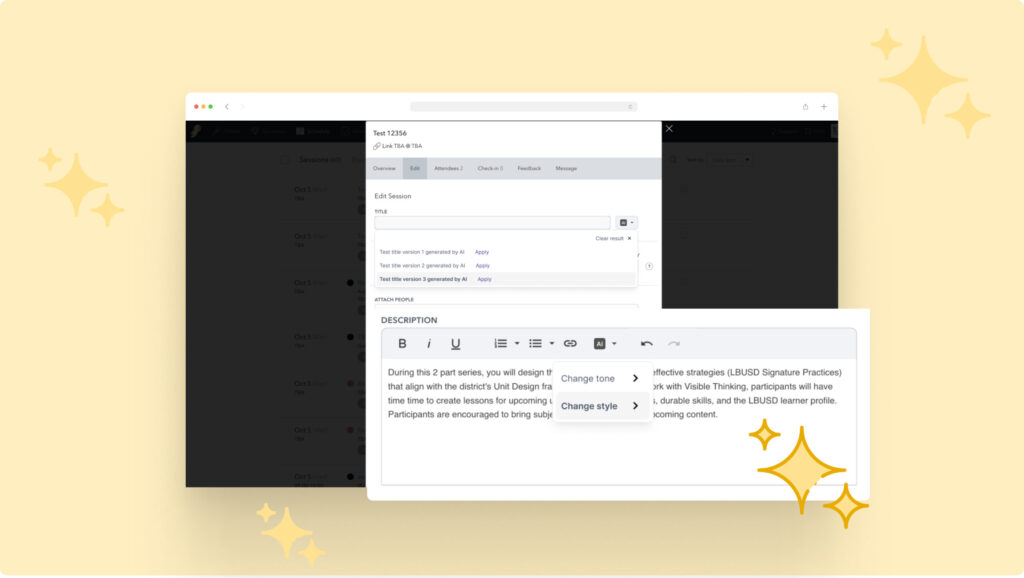Summary
- Identify AI event planning limitations: Understand the early-stage challenges of AI in event planning, analogous to the Wright brothers’ initial flights, and learn how to navigate these hurdles effectively.
- Creative Insights: Explore the limitations of AI in creative decision-making and discover why human intuition and emotional intelligence are irreplaceable in crafting unique and engaging event themes.
- Human-AI Collaboration: Learn why the human touch remains essential in AI-driven event planning, especially in adapting to real-time changes and making complex, ethical decisions.
- Innovative Tools and Features: Discover the latest AI tools that can streamline the process of generating engaging event titles and descriptions, enhancing attendee engagement.
- Future Prospects: Get a glimpse of the evolving capabilities of AI in event planning and have your say in shaping future enhancements, such as personalized session recommendations and dynamic schedule optimization.
The first plane to get off the ground was Stone Age compared to what we have now.
AI is in that early experiments stage too. It has barely gotten off the ground. But this isn’t a hit piece. We’re here to say it’s good. It’s going to become better all the time.
However, as AI event planning revolutionizes the industry, you need to be wary of its current limitations.
If you don’t pay attention, you’ll face the consequences. We’re going to outline them for you. We’ll also provide tips to avoid them, so read on and sharpen your AI event planning!
The creativity gap in AI event planning
Table of contents
- 1 The creativity gap in AI event planning
- 2 AI Hallucination: recognizing and addressing misinformation in AI event planning
- 3 AI event planning still needs humans
- 4 Data reliance and privacy concerns in AI event planning
- 5 The cost of implementing AI event planning
- 6 Embracing FREE AI event planning: The streamlined road ahead
- 7 The takeaways

While AI in event planning can automate tasks and predict behaviors, its ability to genuinely innovate in creative aspects is limited. Here are some key points to consider:
- Lack of deep creativity: AI-generated ideas often miss the nuanced understanding that human creativity brings. This potentially leads to uninspiring and generic event themes. Unlike human planners who draw on personal experiences and emotional intelligence, AI tools generate concepts based on data patterns. Sadly, these may not resonate on a human level.
- Emotional intelligence and adaptability: AI systems do not possess emotional intelligence. That form of intelligence is crucial for adapting to the dynamic nature of live events. Human event planners excel in interpreting emotional cues and making real-time adjustments. This critical aspect is often required in the non-profit and educational sectors where audience engagement is pivotal.
- Generic responses: Overreliance on AI for creative design can result in repetitive and uninspired themes. For instance, in educational events, where the goal is to inspire and engage, the personal touch of a human planner is irreplaceable. Similarly, non-profits, which often rely on emotionally compelling narratives find greater success with human-led creative processes.
FIX – Here are some magical AI descriptions you can implement right now. Here you’ll learn how to make unique event session titles and descriptions that will get noticed and boost attendance rates!
AI Hallucination: recognizing and addressing misinformation in AI event planning
AI systems, despite their sophistication, can also suffer from a phenomenon known as “hallucination,”. This is where they generate false or misleading information. It can lead to several challenges:
- Miscommunication: AI-generated promotional content or communication might include incorrect details about the event. This can lead to confusion among potential attendees.
- Reputational damage: Incorrect or misleading information can damage reputations. This could be bad for the event organizers and the sponsors. This is especially the case if stakeholders perceive the information as deceptive or unreliable.
- Decision-making errors: AI-driven suggestions for event themes, speakers, or content might be based on inaccurate or irrelevant information.
P.S. Learn why, and how much AI can lie in this NYT piece!
To combat AI hallucination and ensure the integrity of event planning, several strategies can be employed:
- Data verification: Implementing robust data verification processes. Check the accuracy of AI-generated content before it is published or used in decision-making.
- Human oversight: Maintaining a system of human oversight by experienced professionals to catch any hallucinations.
- Model training improvements: Continuously updating and improving AI models with diverse and accurate datasets. This reduces the likelihood of hallucination.
AI event planning still needs humans
From Organizing to Execution – How Sched Simplifies In-Person Event Planning from Sched Support on Vimeo.
Think of AI tools like cars. Yes, they can shorten your journey, but they need a human to make them go.
Despite the significant strides made by AI in event planning, the necessity for human involvement remains paramount, particularly in sectors like education and nonprofits where personal touch and understanding are crucial. Here’s why AI still requires human collaboration:
- It’s only as smart as the prompt you give it: Let’s look back at our car analogy. If you put diesel fuel in a petrol car, you’re not going to like the results. You need someone with critical thinking faculties and experience with the problems and goals at hand to feed the machine the right prompts!
- Complex decision-making: AI tools may analyze data and provide suggestions, but humans excel in making complex decisions that require emotional intelligence and ethical considerations. For instance, deciding on event themes that resonate on a personal level with attendees cannot be left solely to algorithms.
- Interpersonal skills: Events are about creating connections. Human planners bring empathy, negotiation skills, and the ability to interpret non-verbal communication, which is essential for personalizing experiences and resolving conflicts that AI cannot manage.
- Adaptability in real-time: Unlike AI, humans can quickly adapt strategies in real-time based on immediate feedback and unforeseen situations during events. This adaptability is especially critical in dynamic environments like nonprofit fundraisers or educational workshops, where audience engagement directly influences the event’s success.
FIX – We’ve put together 90+ amazing AI event planning prompts for ChatGPT. They won’t just empower the human event planner to get the best out of the machine, they’ll ultimately make for a better experience for your attendees!
Data reliance and privacy concerns in AI event planning
AI event planning platforms leverage extensive data collection to enhance attendee experiences through personalized content and efficient management. However, this reliance on data introduces significant privacy concerns and ethical dilemmas:
- Data collection and privacy risks: AI systems gather detailed information about attendees, from personal preferences to engagement metrics. While this data is crucial for tailoring experiences and networking opportunities, it raises issues about consent, data storage, and usage. For instance, without robust privacy protections, sensitive information could be misused or exposed, undermining trust.
- Ethical use of AI: Implementing AI in event planning necessitates transparent policies on data use and informed consent. Organizations must adopt a privacy-by-design approach, ensuring data is handled ethically. Regular audits and bias mitigation strategies are essential to prevent discriminatory outcomes based on flawed AI insights.
- Best practices for data management: To safeguard attendee information and maintain regulatory compliance, event planners should:
- Ensure transparent communication about how attendee data is used.
- Implement stringent data security measures and restrict data access.
- Provide attendees with clear data control options, including easy opt-out mechanisms.
These measures help balance personalization benefits with privacy rights, maintaining attendee trust and compliance with data protection laws.
Why Do Event Planners Love Sched? from Sched Support on Vimeo.
The cost of implementing AI event planning
Implementing AI in event planning presents a variety of costs that organizations, particularly in the education and nonprofit sectors, must consider:
- Development and maintenance costs: Initial development of AI-driven solutions can be substantial. For example, creating an AI-powered event management app typically ranges from $25,000 to $50,000. Additionally, ongoing maintenance and updates are necessary to ensure the AI systems remain effective and secure.
- Hardware and software expenses: Essential hardware like GPUs for processing AI tasks can cost around $10,000 per unit. Software licensing fees also add to the expenses. These often run into thousands of dollars for robust AI applications.
- Personnel and training costs: Skilled professionals such as data scientists and AI engineers are crucial for the development and maintenance of AI systems. Salaries for these roles can range from $119,030 to $161,590 annually. Moreover, continuous training for both AI systems and staff involves additional costs
FIX – For even better budget control, make sure you avoid the hidden costs of event management apps!
Embracing FREE AI event planning: The streamlined road ahead

As we said at the top, this is not a hit piece. We love AI event planning. But you have to take baby steps before you can run.
Our baby steps happen to be an awesome (AND FREE) built-in AI tool for event session title and description generators.
Say goodbye to the time-consuming task of crafting the perfect words and eliminate the stress of creating lackluster descriptions that fail to inspire.
Our integrated AI tool delivers instant, compelling copy that captures the interest of attendees. It frees you up to focus on more critical aspects of event planning. Experience futuristic, professional-looking AI event planning with minimal effort.
Enticing Session Titles That Draw in Attendees
- Imagine AI-generated session titles so appealing they make attendees eager to learn more.
- Simply input a prompt, click, and you’re done! The process is seamless and efficient.
Engaging Session Descriptions That Boost Registrations
- With a catchy title in place, it’s time to seal the deal. Our AI crafts session descriptions are so enticing, that attendees can’t help but hit the registration button.
- Choose from a variety of styles and tones, all at your command. Benefit from AI-powered content enriched with intriguing facts drawn from an extensive knowledge base on your topic.
The Future of AI in event planning
We’re just scratching the surface of AI event planning. Next, we’re going to start walking. Then we’re going to be running.
We’re excited to roll out new AI features across all our tools. But, of course, we evolve our solutions to suit the needs of our users. So tell us what enhancements you want to see first:
- Intelligent attendee matching?
- Personalized session recommendations?
- Dynamic schedule optimization?
- Automated social media engagement?
- Event image generation?
The takeaways
You’ve now been well-warned and equipped to battle the limitations of AI event planning.
You’re now in control to make your event planning even better than before!
You’re also in the driving seat to make the most of our AI event planning features.
And the best part is, you can start Sched for free right now!








